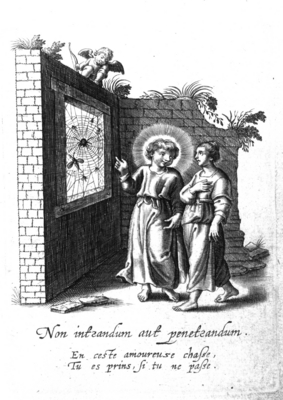Ludovicus van Leuven, Amoris divini et humani antipathia (1629)
Table of contents ↑Retentio Amoris [35]

XXXV.
Prouerb.
VIta hominis Christiani transitus est, ipseque
perpetuus viator. non habemus hic locum
permanentem, sed alium exspectamus. transire
igitur virtutis; hærere alibi, ignauiæ est. gaudet
motu animus Christianus, & in hoc, cœlum sibi
cognatum imitatur. in partibus Scythiæ homines
quosdam numquam domicilium figere, plaustro
se suaque identidem transferre, memoriæ prodi-
tum est. id vere Christianum decet. dolium hoc
nostrum, Diogenis more, identidem volutandum
est, sistendum raro, figendum numquam & nus-
quam. finge mihi aliquem è regione longinqua ad
patriam properantem, in cauponam aliquam le-
pidam ac facœtam incidisse, quæ benigne eum
habeat ac lautè excipiat; hunc ibi, si tanquam ad
sirenum scopulos hærentem cernamus, nunquid
excordem & insipidum iure iudicamus? ita sanè.
Vir fugiens non moratur strepitum lyræ. idem de
te cense. O Amnima! nec illecebris ac lenocinijs
suis mundus hospes, aut caro caupona te impe-
diant, quo minus in veram ac cælestem illam pa-
triam velis, equisque properes.
VIta hominis Christiani transitus est, ipseque
perpetuus viator. non habemus hic locum
permanentem, sed alium exspectamus. transire
igitur virtutis; hærere alibi, ignauiæ est. gaudet
motu animus Christianus, & in hoc, cœlum sibi
cognatum imitatur. in partibus Scythiæ homines
quosdam numquam domicilium figere, plaustro
se suaque identidem transferre, memoriæ prodi-
tum est. id vere Christianum decet. dolium hoc
nostrum, Diogenis more, identidem volutandum
est, sistendum raro, figendum numquam & nus-
quam. finge mihi aliquem è regione longinqua ad
patriam properantem, in cauponam aliquam le-
pidam ac facœtam incidisse, quæ benigne eum
habeat ac lautè excipiat; hunc ibi, si tanquam ad
sirenum scopulos hærentem cernamus, nunquid
excordem & insipidum iure iudicamus? ita sanè.
Vir fugiens non moratur strepitum lyræ. idem de
te cense. O Amnima! nec illecebris ac lenocinijs
suis mundus hospes, aut caro caupona te impe-
diant, quo minus in veram ac cælestem illam pa-
triam velis, equisque properes.

Cat.
Hoc quod rete vides, teneri sit carcer Amoris,
Quæ sedet in medio sit Cytheræa tibi.
Rumpit, & abrumpit casses cordatus Amoris,
Degeneres Veneris molle retardat opus.
Hoc quod rete vides, teneri sit carcer Amoris,
Quæ sedet in medio sit Cytheræa tibi.
Rumpit, & abrumpit casses cordatus Amoris,
Degeneres Veneris molle retardat opus.

L'Arrest de l'Amour.
XXXV.
Peut on veoir en Amour rien de plus ridicule,
Qu' vn amant si coüard, qu' il s'arreste ou recule,
Effrayé du hazard d'vn foible empeschement.
C'est n'auoir point de cœur, ou bien n'estre pas sage,
Car qui auroit au moins quelque peu de courage,
Ne rougiroit il pas de ne passer auant?
XXXV.
Peut on veoir en Amour rien de plus ridicule,
Qu' vn amant si coüard, qu' il s'arreste ou recule,
Effrayé du hazard d'vn foible empeschement.
C'est n'auoir point de cœur, ou bien n'estre pas sage,
Car qui auroit au moins quelque peu de courage,
Ne rougiroit il pas de ne passer auant?
Translations
 |
Restraining of love. |
 |
Not to be entered or penetrated. |
Sources and parallels
-
Same copperplate, slightly altered, in: Het droevigste in de liefde is zyn oogwit niet te beschieten [44]
 (in: Willem den Elger, Zinne-beelden der liefde (1703)
(in: Willem den Elger, Zinne-beelden der liefde (1703) )
[Compare
)
[Compare ]
]
-
Spiderweb, same motto underneath the pictura, in:Non intrandum, aut penetrandum. [39]
 (in: Jacob Cats, Proteus (1618)
(in: Jacob Cats, Proteus (1618) )
[Compare
)
[Compare ]
]
-
Porteman 1975, p. 212. Spiderweb, same motto underneath the pictura, in: Non intrandum, aut penetrandum. [40]
 (in: Jacob Cats, Sinne- en minnebeelden (1627)
(in: Jacob Cats, Sinne- en minnebeelden (1627) )
[Compare
)
[Compare ]
]
References, across this site, to this page:
- Non intrandum, aut penetrandum. [39]
 (in: Jacob Cats, Proteus (1618)
(in: Jacob Cats, Proteus (1618) )
)
- Non intrandum, aut penetrandum. [40]
 (in: Jacob Cats, Sinne- en minnebeelden (1627)
(in: Jacob Cats, Sinne- en minnebeelden (1627) )
)
- Het droevigste in de liefde is zyn oogwit niet te beschieten [44]
 (in: Willem den Elger, Zinne-beelden der liefde (1703)
(in: Willem den Elger, Zinne-beelden der liefde (1703) )
)

